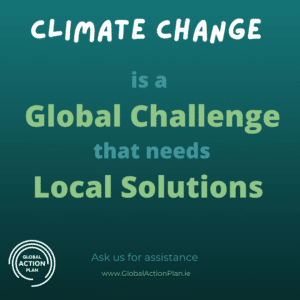Global Action Plan has welcomed the latest report by the Intergovernmental Panel on Climate Change (IPCC).
“Today’s IFCC report is another wake-up call for the international community, and the scientists’ message is clear: Climate change is destroying lives and livelihoods, and it is changing our world. A changing climate requires changing behaviour. It is time to rethink our priorities as a society, and to rethink our habits, our cities and our towns,” said Hans Zomer, CEO of Global Action Plan.
“The IPCC report makes it clear that we have a simple choice: ‘delay and pay’, or plan for a greener way of living,” said Hans Zomer.
The Intergovernmental Panel on Climate Change (IPCC) published part of its 6th Assessment Report on Monday 28 February 2022, providing an overview of the findings of its Working Group on Impacts, Adaptation and Vulnerabilities.
The report looks at the risks to human life and society, based on our understanding of the linkages between climate, ecosystems, biodiversity and human society.
“The IPCC, a United Nations body, provides objective scientific information on climate change, its impacts, and our options to respond to its causes and effects. Its periodic reports, worked on by thousands of scientists from around the world, provide the most reliable analysis of the scientific findings relating to the climate crisis,” said Global Action Plan CEO Hans Zomer.
“Today’s report shows that climate change is pushing people and Nature beyond their limits. Now is the time to take action, and change the path of destruction that we are on. The report is very clear that things are bad, and going to get worse, unless every one of us takes responsibility,” concluded Zomer.
Notes for the editor:
- The Intergovernmental Panel on Climate Change (IPCC) is an intergovernmental body of the United Nations responsible for “advancing knowledge on human-induced climate change”. The IPCC was created to provide policymakers with regular scientific assessments on climate change, its implications and risks.
- The IPCC prepares “Assessment Reports” about the state of scientific, technical and socio-economic knowledge on climate change, its impacts and future risks, and options for reducing the rate at which climate change is taking place. It also produces “Special Reports” on topics agreed by its member governments, as well as “Methodology Reports” that provide guidelines for the collection of data on greenhouse gases.
- The Intergovernmental Panel on Climate Change brings together experts from all around the world. It has four main Working Groups: on the Physical Science Basis, on National Greenhouse Gas Inventories, on Mitigation, and on Impacts, Adaptation and Vulnerabilities.
- The IPCC is currently in its sixth “Assessment Cycle”, during which the IPCC produces the Assessment reports of its Working Groups.
- In 1990, the First IPCC Assessment Report, underlining the importance of climate change played a decisive role in the creation of the United Nations Framework Convention on Climate Change (UNFCCC), the key international treaty to reduce global warming. The Second Assessment Report (1995) provided important material for governments to draw from in the run-up to adoption of the Kyoto Protocol in 1997. The Third Assessment Report (2001) and Fourth Assessment Report (2007) focused attention on the impacts of climate change and the need for adaptation. The Fifth Assessment Report was finalised between 2013 and 2014 and provided the scientific input for the 2015 Paris Agreement.

